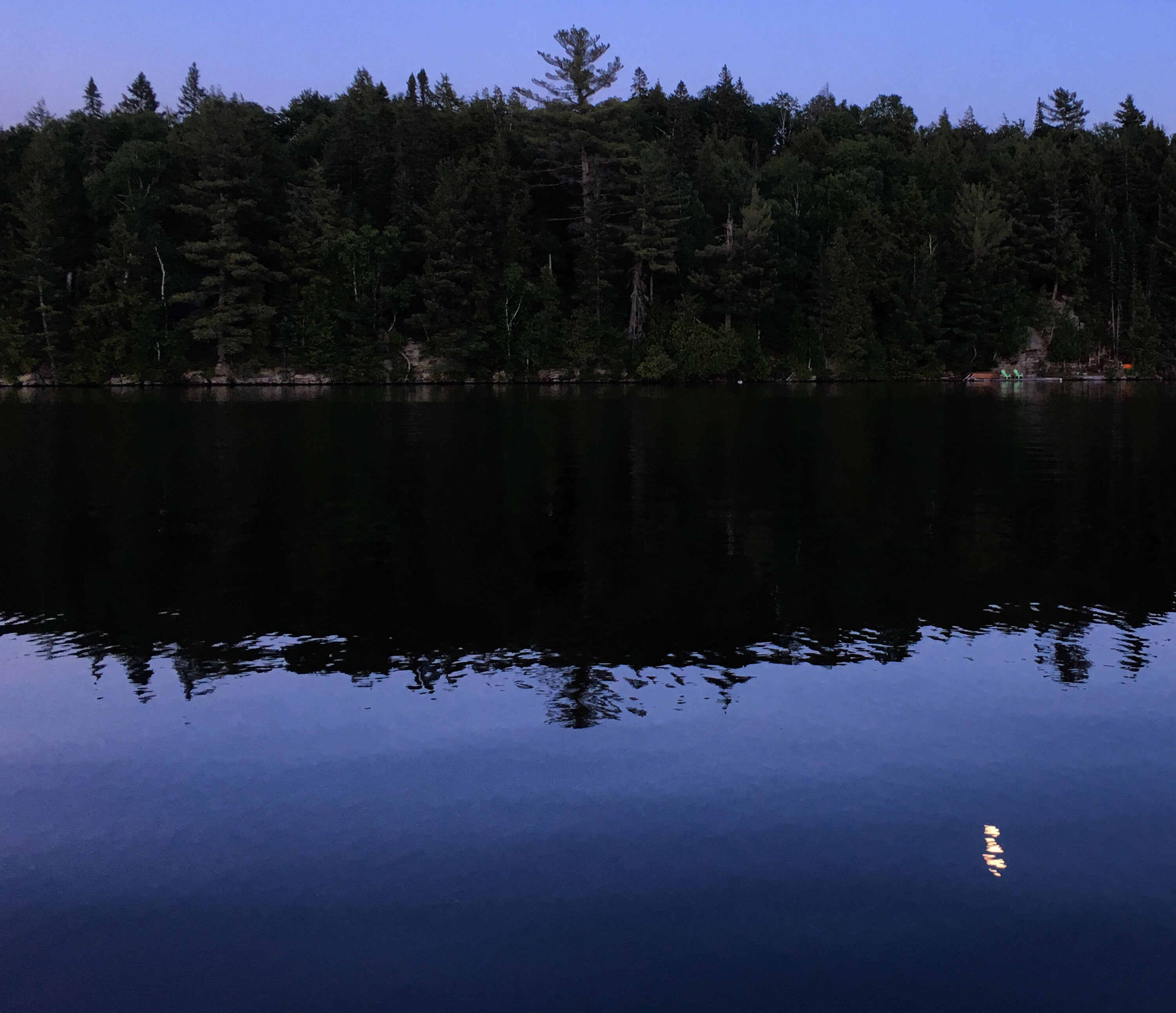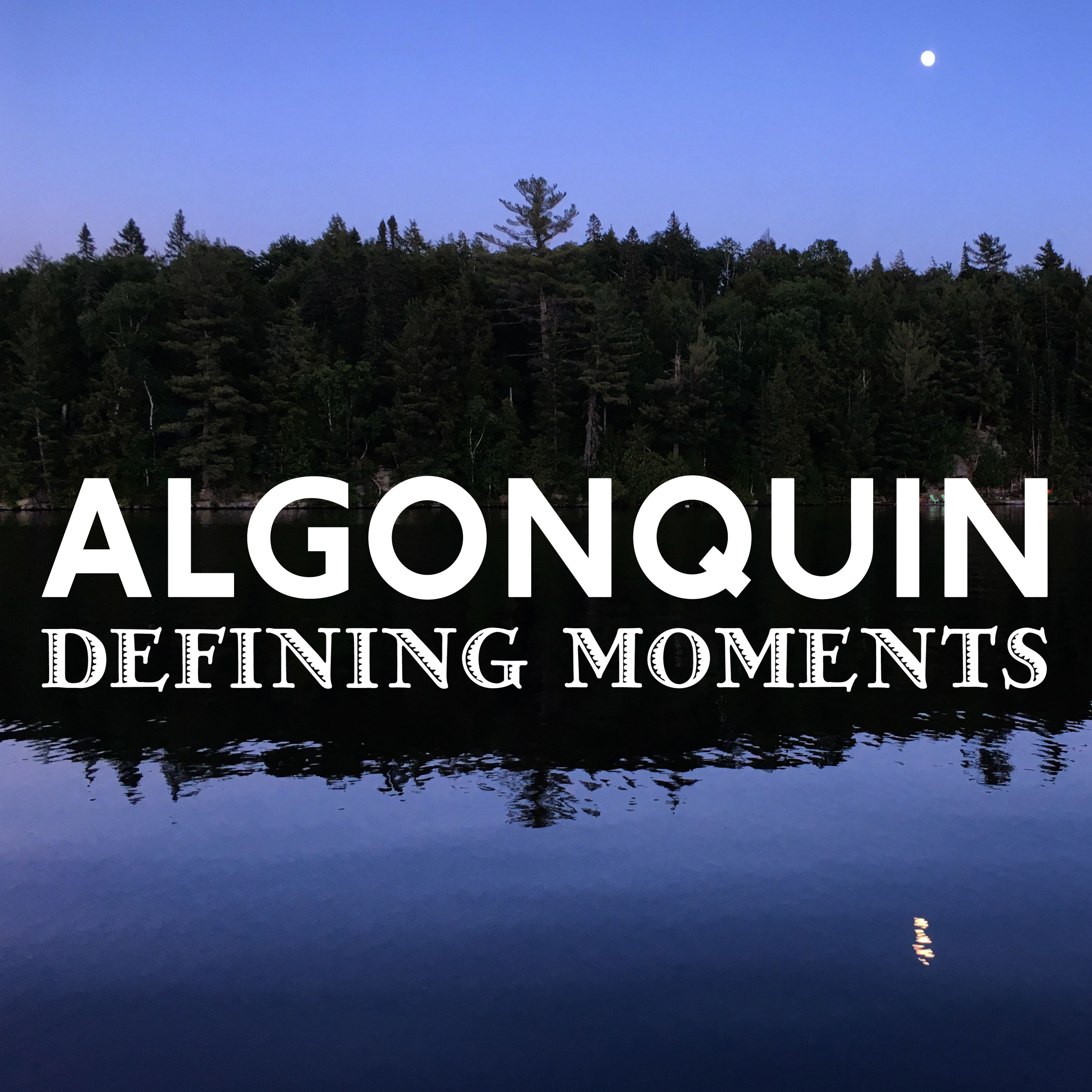
43.9K
Downloads
70
Episodes
For over 20 years I've been collecting stories, photographs, interviews, out of print books and researching various aspects of the human history of Algonquin Park in Ontario Canada. In other words, capturing voices from the past. In the fall of 2020, I launched my podcast 'Algonquin Defining Moments' to both complement my published books but also to continue my mission of sharing stories, recollections, traditions, landmarks and other fun Algonquin Park human heritage curiosities. In this way that those who share my passion for everything Algonquin Park can listen to snippets of the park and its people while commuting, walking, cooking, working around the house or even just meditating on the back deck. Enjoy! Gaye Clemson
Episodes
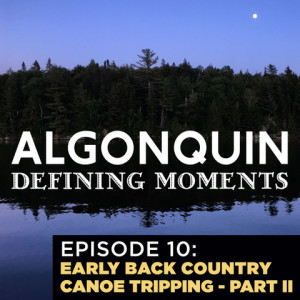
Friday Mar 26, 2021
Episode 10: Back Country Canoe Tripping Part II
Friday Mar 26, 2021
Friday Mar 26, 2021
Episode 10: Back Country Canoe Tripping Part II
As noted in Episode 9 backcountry canoe tripping has been an integral part of the Algonquin Park, Ontario Canada experience since well before the Park’s beginnings in 1893. This follow-on episode focuses on what the landscape was like that our three canoe trip parties paddled through including majestic waterways, beaver dam filled rivers, and muddy swamps; how they overcame the pains of portaging, cooked over an open fire, and dealt with the bugs as well as the joys of a balsam bed.
Diaries and pictures and books by these canoe tripping parties that are the core references for this episode include one of the area’s first surveyors James Dickson, who brought a group of friends on a month-long fishing and canoe tripping holiday around 1885. They came in from Dwight up the Oxtongue and then continued on to Canoe Lake and as far north as Burnt Root. George Hayes undertook several trips in 1896 and 1897 and photographed them extensively. In 1903, three park ranger guides took Boston Architect Ernest Machado, his brother Jose and brother-in-law Alfred Whitman on a 12-day trip from Canoe Lake to Victoria Lake. They headed north from Canoe Lake to Big Trout and from there to Opeongo and then south down the Opeongo River through Booth Lake to Victoria Lake. The third reference is a fishing trip that John Robins and his friend Tom took on the east side of the Park as portrayed in Robins' book The Incomplete Angler.
I’ve also created a collage of pictures from the Machado 1903 trip and George Hayes 1895-97 trips, which can be found both on my YouTube Algonquin Defining Moments channel
and as a slide show on my website www.Algonquin parkheritage.com.
https://www.algonquinparkheritage.com/podcast-pics-and-vids.html
Enjoy!!!
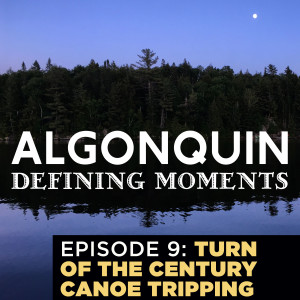
Wednesday Mar 10, 2021
Episode 9: Turn of the Century Backcountry Canoe Tripping Experiences - Part 1
Wednesday Mar 10, 2021
Wednesday Mar 10, 2021
Episode 9: Turn of the Century Backcountry Canoe Tripping Experiences - Part 1
So backcountry canoe tripping is one of those past times that you either love or you absolutely hate or, as the mother of a childhood friend said, you do it so that you can talk about it afterwards. Have you ever wondered though, what it must have been like venturing into the ‘wilderness’ or the bush as it was called back in the day?
The truth is that backcountry canoe tripping has been an integral part of the Algonquin Park, Ontario Canada experience since its beginnings in 1893. The stories I’ll share in this episode are based on three canoe tripping experiences, two from the late 1800’s early 1900s and another from the early 1940s. The first is surveyor James Dickson’s month-long fishing and canoe tripping holiday that took place around 1885 in the Canoe Lake to Burnt Root area, The second is a park ranger-guided trip that Boston Architect Ernest Machado took with his brother Jose, brother-in-law Alfred Whitman and 3 park guides in 1903. The crew traveled from Canoe Lake to Big Trout and from there east via Merchant to Opeongo and then south down the Opeongo River through Booth Lake to Victoria. The third was a fishing trip that John Robins and his friend Tom took on the east side of the Park. They started at Radiant Lake and after a trek down and back up White Partridge Creek, headed west to Lavielle and from there to Opeongo via the Dickson-Bonfield portage. Of course, there are tidbits from other trips including my own as a child.
In this episode, I’ll focus mostly on the basics, such as equipment and food, and in the next one, I’ll talk about what the landscape was like and the actual physical experience.
I’ve also created a collage of pictures from the Machado 1903 trip, which can be found both on my YouTube Algonquin Defining Moments channel and as a slide show on my website www.Algonquin park heritage.com. Enjoy!!!
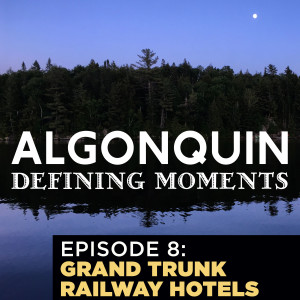
Tuesday Feb 16, 2021
Episode 8: The Grand Trunk‘s Long Lost Algonquin Railway Hotels
Tuesday Feb 16, 2021
Tuesday Feb 16, 2021
Episode 8: The Grand Trunk's Long Lost Algonquin Railway Hotels
In the late 1800s, outdoor recreation in Ontario was just starting to become a ‘thing.’ Folks who lived in cities were anxious to escape their urban and industrial woes and reconnect with the wilderness. In 1905 the Grand Trunk Railway had just acquired J. R. Booth’s Canada Atlantic Railway, which in turn had merged with his Ottawa, Arnprior and Parry Sound Railway that ran through the southern end of Algonquin Park a few years earlier.
Charles Melville Hays, President of the Grand Trunk Railway, who went down with the Titanic in 1912, apparently had a passion for hotels in addition to railways. His view was that the best way to increase passenger traffic on his northern lines and take advantage of the growing interest in outdoors recreation was to establish hotels and well-appointed rustic resorts at certain key locations. Though most of his hotels were in big cities like Ottawa, Edmonton and Winnipeg, he established three along his newly acquired rail line that ran, as indicated previously, through the southern end of Algonquin Park. In 1908 the Highland Inn was built on Cache Lake and in 1912 Camp Nominigan was built on Smoke Lake and Camp Minnesing on Burnt Island Lake. Except for a series of outdoor sign boards at Cache Lake put up by the Friends of Algonquin Park in 2008 and a plaque hidden in the bush on Smoke Lake that was mounted there in 1969, there are few if any signs that any of these vacation paradises ever existed.
In this episode, I’m going to try to bring each of them to life and share not just the lodges history, but hopefully give listeners a sense of what it must have been like to vacation there. Most of the content for this episode comes from two key sources. The first is the late Don Beauprie’s 2011 book called Destination Algonquin Park, Tracks to Cache Lake and the Highland Inn. Second is my own entitled, Nominigan and other Smoke Lake Jewels that was published in 2012. I’ve also posted photographs that I have on my Algonquin Park Heritage website for you to peruse at your leisure. Note that there is also a video version of this episode on my Algonquin Defining Moments YouTube channel. (https://youtu.be/5tXI2Wxj5iw)
Enjoy!!!
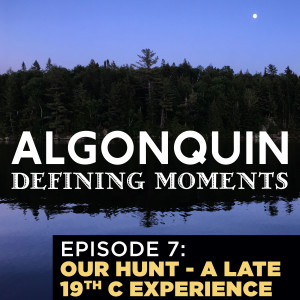
Friday Jan 29, 2021
Episode 7: A late 19th Century Bear Hunt
Friday Jan 29, 2021
Friday Jan 29, 2021
Episode 7: A late 19th Century Bear Hunt
Just outside the park boundary on the east side, on Victoria Lake, is a large hunting lodge owned for over 50 years by a former Governor of Vermont, Edward Curtis Smith and his family. Whilst researching the history of the lodge and its connection to the town of Madawaska, (to be published Feb 2021) I came across a short story about a family bear hunting expedition. Though the author, Nancy Bailey, is not known, it seems that many of the protagonists were actual people and if the ages are generally correct, the story likely took place in 1898 or 1899. Though not directly an Algonquin Defining Moment, the story did seem to be a suitable conclusion to the poaching and trapping in the park series. As best as I have been able to discern it pretty accurately reflects an idealized vision of manhood that was taking hold at the time of primitive, frontier manliness and athleticism.
It also provides a marvelous introduction to ‘life in the wilderness’ or at least a certain style of ‘life in the wilderness’, which will be the subject of Episode 8. There, I will share the history of three great lodges long gone namely The Highland Inn on Cache Lake, Nominigan on Smoke Lake and Minnesing on Burnt Island Lake.
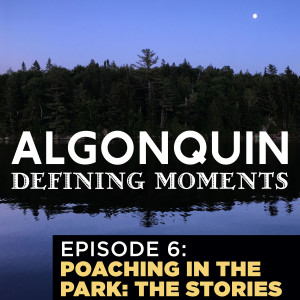
Tuesday Jan 05, 2021
Episode 6: Algonquin Park Poaching Stories
Tuesday Jan 05, 2021
Tuesday Jan 05, 2021
Episode 6: Algonquin Park Poaching Stories
As shared in Episode 5, one of the downsides to the creation of Algonquin Park in 1893 was the fact that a significant number of folks in the local communities around Algonquin Park were now considered outlaws because they were running trap lines in what was now a protected area. They went overnight from being fine outstanding citizens trapping to supplement farming and logging livelihoods to unenlightened, disreputable and heartless bandits. This second of two episodes is focused on sharing a broad collection of stories and tall tales; adventures and lifestyles recollected by both poachers and the park rangers who tried to track them down.
Contributions come from many well known trapping and poaching personalities including Ralph Bice, Joe LaVally, Emmett Chartrand, Matt Lavally, Stewart Eady, Jack Gervais and Bill Mooney amongst many others. A special shout out to my friend and colleague Roderick (Rory) MacKay whose sentinel book Algonquin Park, A Place Like no Other is a key reference for this narrative. His book is a ‘must-have’ reference for everyone who has a passion for Algonquin Park.
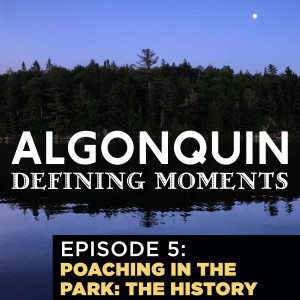
Saturday Dec 12, 2020
Episode 5: A History of Poaching and Trapping in Early Algonquin Park
Saturday Dec 12, 2020
Saturday Dec 12, 2020
Episode 5: A History of Poaching and Trapping in Early Algonquin Park
One of the downsides to the creation of Algonquin Park in 1893 was the fact that a significant number of folks in the local communities around Algonquin Park were now considered outlaws because they were running trap lines in what was now a protected area. They went overnight from being fine outstanding citizens trapping to supplement their farming and logging livelihoods to unenlightened, disreputable and heartless bandits. This first of two episodes on the topic of poaching in Algonquin covers the history of legal and illegal hunting of fur-bearing animals in Algonquin during its first 50 or so years of its existence. This episode focuses on the human history as seen from the perspectives of those who participated and those in authority and a few other passers-by. The next episode (No. 6) will focus on stories and tall tales recollected by both the poachers and the rangers who tried to track them down.
A special shout out to my friend and colleague Roderick (Rory) MacKay whose awesome book Algonquin Park, A Place Like no Other is a key reference for this narrative. His book is a ‘must-have’ for everyone who has a passion for Algonquin Park.
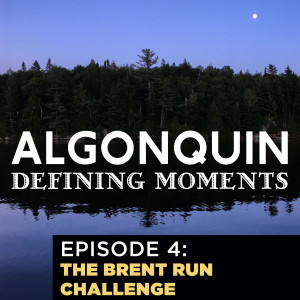
Monday Nov 23, 2020
Episode 4: The Brent Run Challenge
Monday Nov 23, 2020
Monday Nov 23, 2020
Episode 4: The Brent Run Challenge
Though perhaps hard to believe by some, since the 1930s there has been a hidden challenge by locals primarily from Camp Ahmek and the Portage Store staffs on Canoe Lake in Algonquin Park to see if it’s possible to complete the entire 160-kilometer trip in less than 24 hours. The trip includes just about every possible terrain that it’s possible to experience in Algonquin Park including large and small lakes, winding creeks, bogs, rapids and portages long and short.
In the summer of 2013 two women, Quinn Cathcart and Rachel Quinby, decided to make an attempt. As a frame of reference, in my youth, the backcountry canoe trip from Canoe Lake to Brent was a weeklong adventure with three days each way and a rest day in between. In the late 1960s the rest day included getting up in the pre-dawn to hitch a ride on the CN train to Kiosk and then paddling pack to Cedar Lake.
This episode is the story of Quinn and Rachel's transforming, hair-raising and exhausting 43-hour journey and shares details of what was an incredible learning experience. Everybody has their own Brent Run Challenge - this was theirs.
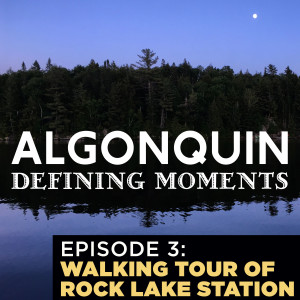
Monday Nov 02, 2020
Episode 3: A Walking History Tour of Rock Lake Station in Algonquin Park
Monday Nov 02, 2020
Monday Nov 02, 2020
Episode 3: A Walking History Tour of Rock Lake Station in Algonquin Park
This episode takes the visitor on a walking tour of what was once a bustling community of railwaymen, loggers, tourists and leaseholders and their families at Rock Lake in Algonquin Park. Today Rock Lake Campground is one of the largest campgrounds in Algonquin Park and unless one realizes that the road through it was once the railway bed, you'd never know that for almost 40 years a different Rock Lake existed. The tour takes Algonquin Park history or railway enthusiasts to several locales and shares, insight into the people and places that once existed there so long ago. You'll get introduced to William and Ida McCourt and Shawna Lodge, Billy Baulke and his cottages, Beulah Eady and her joy of music and dancing, and of course Gertrude Booth Fleck and the Fleck Estate and her daily fishing expeditions and of course the train station activities that were the center of the community.
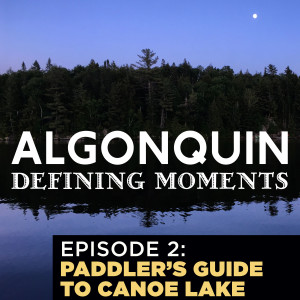
Saturday Sep 05, 2020
Episode 2: A Paddler‘s Guide to the Lost History of Canoe Lake‘s Algonquin Park
Saturday Sep 05, 2020
Saturday Sep 05, 2020
Episode 2: A Paddler's Guide to the Lost History of Canoe Lake's Algonquin Park
Located about 14 km in from the West Gate and unbeknown to most, Canoe Lake has a deep and colourful history well beyond the Tom Thomson Memorial Cairn and Totem Pole and the Canoe Lake Cemetery, where according to some, the spirit of Tom Thomson once rested for a while. This podcast shares the highlights of about a dozen landmarks around the lake. For those who are checking it out in a canoe, you’ll have to use your imagination as little if anything of most of these landmarks remains.
First we will start with our launching spot on Portage Bay, which is the home of the Portage Store. Then we’ll head north up the lake to a few notable sites mid lake including Braught’s Lighthouse, The Tom Thomson Memorial Cairn and Totem Pole and Whiskey Jack Creek. Then we’ll paddle to the north end and head to Joe Lake Dam and investigate landmarks that are no longer there including Joe Lake Station, the Algonquin Hotel and Colson’s Store. Then we’ll back track and head up Potter’s Creek and check out the remains of the Trestle Bridge and Omanique’s saw mill as well as Canoe Lake Station. Then we’ll head back down the lake and end with an view of the former Town of Mowat and Mowat Lodge on the north eastern shore.
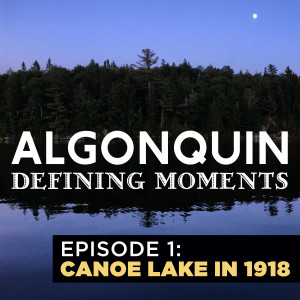
Monday Aug 31, 2020
Episode 1: Life on Algonquin Park‘s Canoe Lake in the Pandemic Year 1918
Monday Aug 31, 2020
Monday Aug 31, 2020
Episode 1: Life on Algonquin Park's Canoe Lake in the Pandemic Year 1918
It was 1918, the first year of the Spanish Flu pandemic and a year after the artist Tom Thomson had died under mysterious circumstances on Algonquin Park's Canoe Lake. This episode focuses on what life was like at Canoe Lake at the time including challenges getting there, the landscape, community economics, insight into the lives of some of the key residents and a peek at healthcare challenges of the times.
